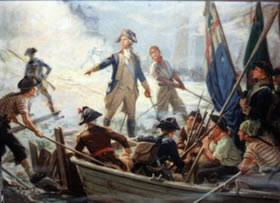My Scrappy Shawl grows as it's the knit I always want to grab. I love mixing leftover yarn and designing it in a purposefully haphazard way to make it look "scrappy".
"Valiant Ambition" ended up a perfect choice. It starts with Washington in New York and then details Benedict Arnold's heroic exploits that sometimes land in massive failure (leading his troops up the wilds of Maine to invade Canada) and sometimes positively alter the course of the war even though a failure (his battles on Lake Champlain). No matter what Arnold is overlooked for promotion. The book steadily will go back and forth describing four years of war for both men and how Arnold ultimately succumbs to treachery yet was at first an able general that was helping us win the war. Often in history, Arnold has been vilified throughout his life as an evil person. This account tries to show how and why he fell from patriot to traitor. I'm enjoying it! (It is so tempting to get it on Audible, but while it sounded good, I mean really good, I resisted. I do have a pile of books on this subject and Audibles and Kindles. My only excuse is I'm really getting a good grasp of the Revolutionary War and I feel like it's the first time I'm really doing it, studying history.)
Interesting articles and talks from Nathaniel Philbrick:
"Why Benedict Arnold Turned Traitor Against the American Revolution"
YouTube: Nathaniel Philbrick, "Valiant Ambition" Bookstore Lecture
and
NPR - 'Valiant Ambition' Tells Of Benedict Arnold's Turn From Hero To Traitor
YouTube: Nathaniel Philbrick, "Valiant Ambition" Bookstore Lecture
and
NPR - 'Valiant Ambition' Tells Of Benedict Arnold's Turn From Hero To Traitor








































